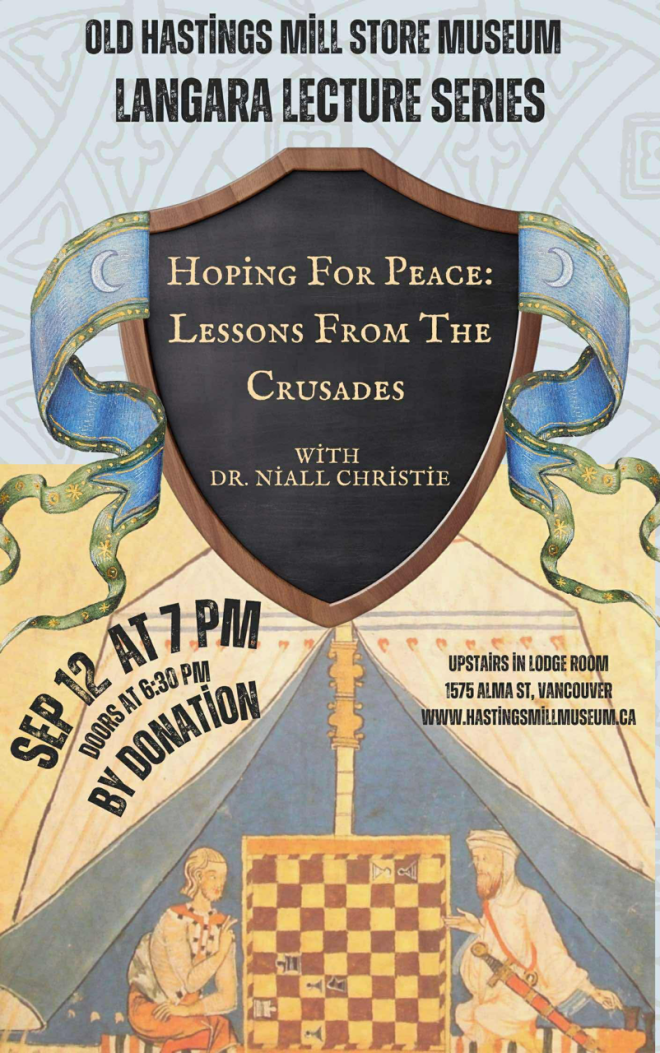Series description
Watching the news media today, it is easy to see that we live in a world afflicted with political and social turmoil, wars, and environmental disasters. In the face of this it can be difficult to maintain a positive outlook, but in both the past and the present we can find examples that give us reasons to still be hopeful. Join us as instructors from various departments at Langara College explore some of these cases, showing us that hope can be found even in the gloomiest of times, sometimes in unexpected places.
All lectures will take place at Old Hastings Mill Store Museum, 1575 Alma St, Vancouver, BC V6R 3P3, on the specified dates (Friday evenings), at 7:00 p.m.
Entry is open to all and by donation.
Series dates
- September 12: Hoping for Peace: Lessons from the Crusades
- October 10: Finding Hope in the Classroom: Teaching an Art History of Exclusion
- November 14: How Fairy Tales Can Fix the World
Hoping for Peace: Lessons from the Crusades
September 12
Niall Christie (History)
The crusades are often depicted in the media as a time of unrelenting wars between Christianity and Islam. However, this greatly misrepresents a period that, while at times witnessing vicious conflicts between Christians and Muslims, nonetheless saw extended periods of peace, trade, and cultural exchange. In this talk we will explore the wider interactions between the people who lived through these times, to see what lessons we can draw from the past that might help us in the present.
Finding Hope in the Classroom: Teaching an Art History of Exclusion
October 10
Randip Bakshi (Art History)
Should we ask painful questions in class? I start my course, Worldviews: A Global Approach to Art, with this prompt. I use Vancouver as an example of global currents, especially migration and movement, to ask difficult questions about our city’s past. By using neighbourhoods in Vancouver—some ethnic enclaves, others not so much—I introduce students to the idea of urban space and architecture as an art historical text. I also try and use the histories around these neighbourhoods as a way to ask difficult questions about our present. Issues such as belonging, ghettoization/homogenous neighbourhoods, integration, and/or racism become central to our class discussions. In this talk, I want to share how Vancouver is connected to larger global forces. I also want to share my students’ projects and the assignments in my classes to highlight the difficult questions we all need to hold space for. My students and I find hope in our classroom as we navigate these painful questions.
“Cry out our loud grief, and learn all we may!”*: Aeschylus’ Persians and the Healing Technologies of Tragedy
November 14
Kina Cavicchioli (English)
Aeschylus’s Persians is the oldest surviving Greek tragedy that we have. It is also the only surviving tragedy that deals directly with a “real” contemporary event, rather than a mythological subject: the war between the Greeks and the Persians, specifically the battle of Salamis, at which Aeschylus himself had fought less than 10 years before writing the play.
In the intensely military culture of 5th-century BCE Athens, with the Greek city states the unlikely victors against the mighty Persian Empire, what kind of play would you expect one of the victorious survivors to write, to be performed before fellow veterans, in the city that was still being rebuilt after being besieged and burned by the Persian army?
What Aeschylus does - and what Tragedy can do - will surprise you.
*The quotation is from Christopher Collard’s translation of Persians in Aeschylus: Persians & Other Plays (Oxford University Press, 2008), p.28.

